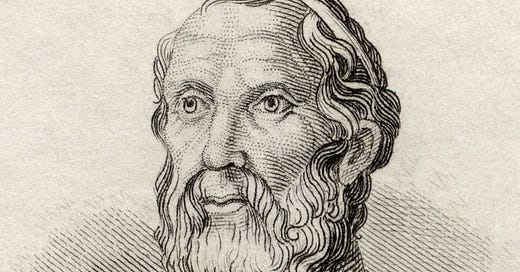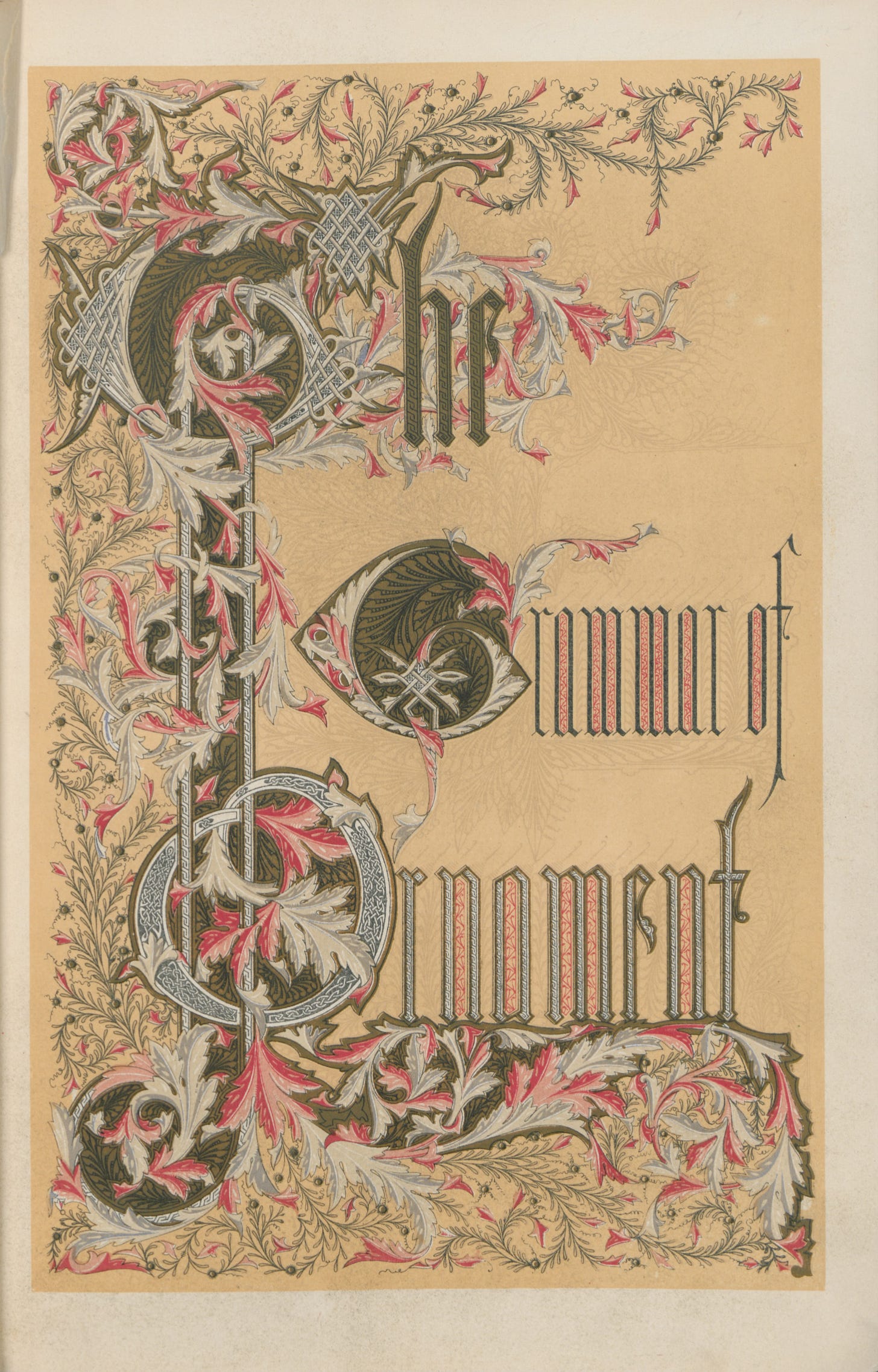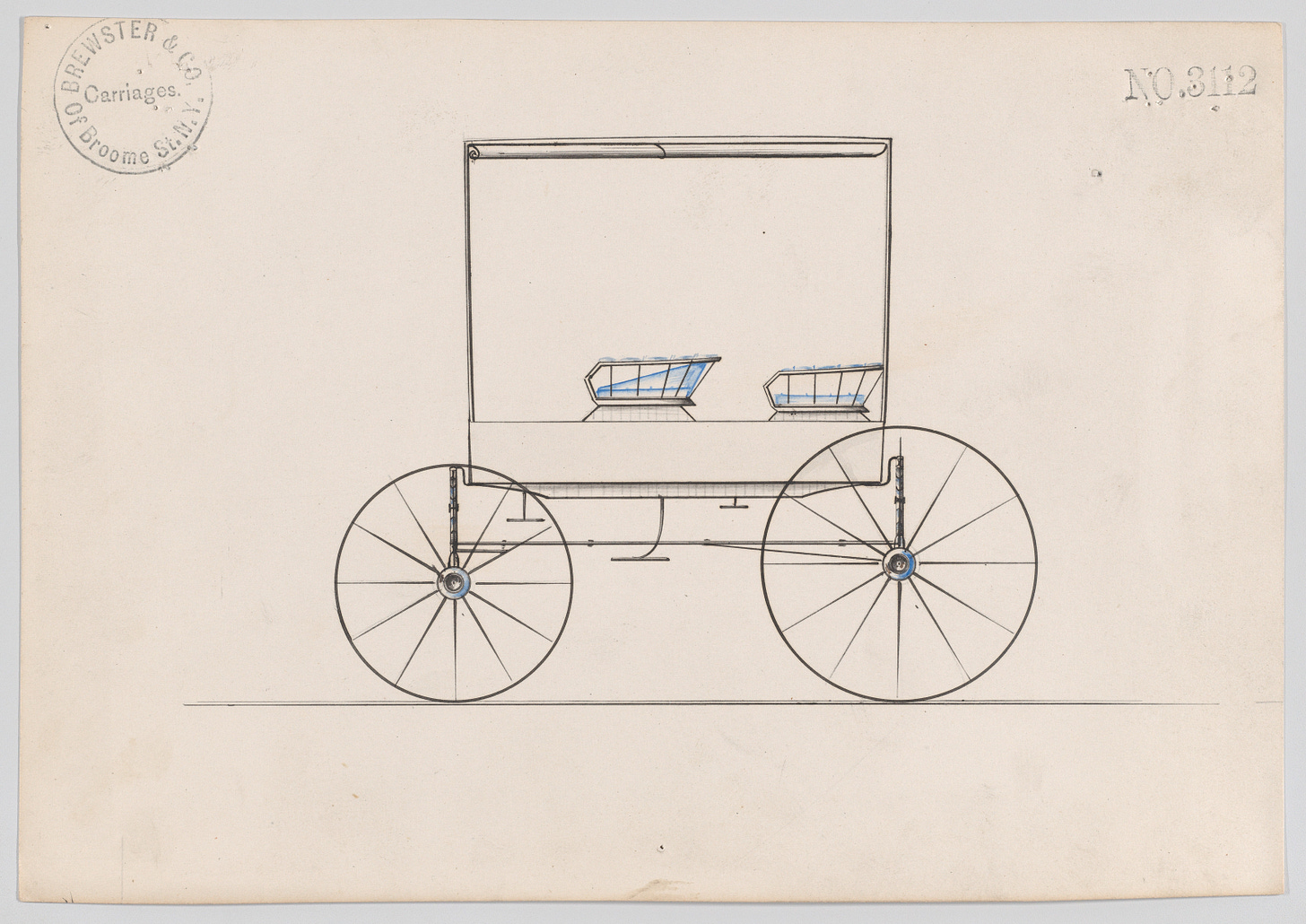Reminder: our members-only Zoom call is tonight at 8 PM Eastern. I will send a Zoom link to paid subscribers about 30 minutes prior.
If you want to join the call, subscribe below.
We’ve done it, everyone — we have read the entirety of Aristotle’s Nicomachean Ethics this summer.
If you are someone who only read selections or who perhaps could not find the time to finish the book, take heart: the posts from this read-along are available for free in perpetuity. There is now a tab in the navigation bar of this newsletter dedicated to the this read-along, next to the similar tab for the Meditations. You can read at your own pace, should you choose to do so.
If you are someone who kept pace with the read-along: congratulations. Dedicating a few hours per week to read Aristotle in an achievement in itself.
Today’s entry is a reflection on what we’ve learned in the course of our read-along. This was scheduled for tomorrow, on our usual Monday slot, but I thought I’d send it early since we have our Zoom call tonight.
Before we move on to that, however, let me talk about the next read-along.
Starting in October, we’re reading Mrs Dalloway. This is intended to be a brief read-along, because the book is very short. I will post the exact schedule soon, though we have a bit of a difficulty: Mrs Dalloway has no chapters. If I say we’re going to read a certain section, I have to identify it via pagination, but that presumes a single edition. Alas. I’ll solve this problem this week.
Since Mrs Dalloway is only about 150 pages, we can read it in a month or so — 50 pages of prose in a week is very different than 50 pages of Aristotle, after all. So I am already thinking about our next read-along, which will be another work of philosophy. (I previously said no more Greeks for a while, but I have an itch to read Plotinus…)
Alright, let’s turn to Aristotle one last time. After you have read my thoughts about our little read-along, let me know what you’re thinking down in the comments.
What has stood out to me as we have read the Nicomachean Ethics together is how systematic of a thinker Aristotle is. Every part of his philosophy – biology, metaphysics, ethics, epistemology, rhetoric – is connected. To be an Aristotelian about ethics but not about metaphysics, say, is probably untenable.
As an analytic philosopher, I was taught to separate issues as much as possible. This leads to a very piecemeal way of doing philosophy, and there are advantages to this approach. But as I have gotten older – I’m in my mid-30s, so I’m not that old, I swear – I have come to really appreciate more systematic thinkers. When I rattle off the philosophers I admire, I say Plato, Aristotle, Plotinus, Spinoza, Hegel, and so on. These are system-builders.
If you struggled with Aristotle’s ethics, the best thing to do is to go and read more Aristotle; maybe try to crack open the metaphysics, or go to the work on poetics for a slightly lighter read. Get a better feel for the Aristotelian mind. I admit I am only slightly familiar with proper Aristotelian metaphysics; I may need to read more of him soon.
When focusing just on the ethics, however, a few key lessons stood out to me in this read-through. These are things I need to keep in mind going forward.
Aristotle says that the point of work is to reach a state of leisure, just as we go to war to make peace possible. ‘Leisure’ is an odd term, however, and it isn’t well-defined. It is important to keep in mind that philosophy is a leisure activity for Aristotle.
When writing became my career, it became work. I still enjoy what I do; I fear the day when writing ceases to be enjoyable. But there is work to it — especially for the book project. It is very important to remember why we do this, to what end our work strives. For me, the answer is clear: I am a philosopher, and I want to be able to think about philosophical matters until the day I die.
Some of you may not know this, but when I left academia, I decided I hated philosophy. I decided to focus on only useful things for a while. I simultaneously became more religious, and I thought reading philosophy was pointless compared to reading theology or works of spiritual writing. I indulged in some true American anti-intellectualism. In hindsight, it was a coping mechanism. I was bitter about leaving, even if it was my choice; I suspected, deep down, that I had been robbed of a career as a professor; I feared I had robbed myself. The negativity sublimated, and I began to view my field of choice as the problem. I even wondered if I had wasted my twenties.
It has taken me a few years to see it properly, but I was a damn fool. Philosophy could never be contained by the academic system, especially not our current (broken) university model. I had not wasted my twenties; I had spent six years in graduate school reading and writing; even if I didn’t care as much for analytic philosophy, I still had become a better thinker; I could continue to study philosophy and to do philosophy for the rest of my life.
Even still, work gets in the way. Sometimes the work of running a philosophy business – I guess you could say that’s what I do – gets in the way of being a philosopher. Aristotle’s emphasis on leisure as the end of work and, ultimately, on the importance of contemplation in human life has been a wake-up call.
The highest form of knowledge, Aristotle tells us, is knowledge of the necessary. These are eternal, timeless, unchanging things. These are topics I’d like to return to for a time.
Aristotle’s writings reminded me of another important book in my life: the Rule of St Benedict. I have mentioned before that Benedict is my patron saint — I chose him, insofar as anyone ever really chooses a patron, because of his emphasis on work and discipline, but I now see that I was misguided in my thinking. Benedictines have an informal slogan: ora et labora, prayer and labor. They say this because these monks work in the fields in order to sustain their communities; the ideal of the Benedictine monastery is to be self-sufficient. But the work really is secondary; they work so that they can read and pray.
In the Rule, Benedict is very strict about this. There are many hours set aside each day for the daily services and for private reading. During Great Lent, a book is distributed to each brother for him to read on his own during that ascetic season. Labor is confined to assigned hours so that it does not encroach. The work of their hands serves a purpose; it is done so that they can read and pray.
You don’t have to be Orthodox, or any sort of Christian, to see the wisdom here. If you are working just for the sake of work, and especially if you are not making time for reading and contemplation, then you’ve lost sight of why we work.
It is not only contemplation and work that have been on my mind as we’ve read Nicomachean Ethics together. I have been pondering two of the particular virtues.
First, courage. Many of us will not face enemies on a battlefield. We will not have to think about how a soldier acts in battle — though there are a few reading this, I suspect, who have had to do so previously. What do we make of courage if we are not fighters?
It seems to me that courage in the intellectual world is where most of us need to focus. To be intellectually courageous is to be unafraid to state one’s considered beliefs – not spouting bullshit and mere opinions and demanding they be taken seriously – regardless of how others might respond. To be intellectually courageous, I would suggest, is to see that truth is the highest ideal of speech. This is not a license to be an ass, but it is a reason not to care if you are called an ass for earnestly trying to discern the truth.
Second, prudence. A reader asked in one our Zoom calls what we could do to cultivate prudence. Given that prudence is so essential to the ethical life, this is a crucial question. Yet, I fear I do not know how one becomes more prudent. I do not even know if I am prudent; I suspect that I am not.
For the Aristotelian, moral education is crucial. The virtues must be inculcated. If we don’t know how to inculcate prudence, then the project is doomed. This is something to consider going forward.
And finally, a brief appeal.
These read-along posts don’t do well compared to other writing on my newsletter, but I so greatly enjoy writing them and building this little community. They are quite special to me. Writing them and making them available for free is worth it, even if it doesn’t make business sense.
If you have enjoyed this read-along, you can support me in one of of two ways.
You could become a paying subscriber. This is the most direct way to support me, but I know that not everyone can justify the expense due to finances, their own reading habits, or their own assessment of my work’s value. That is the beauty of Substack’s model, actually: if only about 10% of you see this as worth financially supporting, that makes it all possible for the other 90%. I like this model of content; I think it is the future for a healthier internet.
But you could also share this newsletter with someone you think might enjoy it. This could be via email, word of mouth, or Substack Notes — the medium isn’t the most important part. If you think someone might want to read Aristotle or some other great philosophers, or they like to be told that it is good to be a failure, that they need to slow down in order to save their minds, or they just want occasional book recommendations, tell them about Walking Away.
Thank you.








Dear Jared,
Thanks for the summer of Aristotle. Nicomachean Ethics had long been on my list of 'must reads', but until your read along, I had never marshalled the discipline to work through it. I am reading a lengthy summary right now in preparation for your Zoom call at 8 PM by the way.
I wanted to mention that you are not the only one to feel disappointment with the current state of universities and their relationships to students and faculty. A feeling of anguish is widespread, and it has to do with academic administrators, whose numbers have exploded relative to the real producers, who are the students and faculty. Their objective is to divert funding to cover costs that are not the core mission of the university, and they can make you miserable if you do not obey using your own hard-won resources. In my opinion, the mushrooming involvement of federal government in educational policy is the root cause. I taught for 40 years and I learned the hard way that the quality of courses is not high on the list of most administrators, who are really interested in obeying federal rules and regulations.
But the value of the philosophical way of life remains. If you have a copy, Alexandre Dumas' The Count of Monte Cristo explains it beautifully. In Chapters XV-XVII, two innocent inmates of a prison, Edmond Dantes and Abbe Faria, meet using a tunnel between two cell walls. The Abbe explains that Dantes does not understand his imprisonment and disappearance from the world of the living, even in the face of innocence, because he is thinking about the problem in the wrong way.
He says, "Hence the maxim: if you wish to find the guilty party, first discover whose interests the crime serves! Whose interests might be served by your disappearance?" From there the two of them reason out who was responsible. In terms that Cicero would use, the question is, 'cui bono?'.
Thanks again.
These read along posts have been insightful extras. Thank you for your efforts each week. I think others may believe that since they were not reading the book there is nothing for them, which is incorrect. Your posts stand on their own and any reflective, reasoned thinker will benefit. I suspect if you reposted them independent of the read along, they would get similar viewing as your other posts.